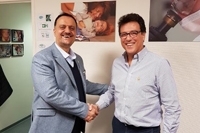EURORDIS Partnership with RADOIR
EURORDIS-Rare Diseases Europe has recently signed an agreement with the Rare Disease Foundation of Iran, a non-profit and non-governmental institution that provides services for rare disease patients and their community in Iran.
Created in 2008, RADOIR was established by an entrepreneur, M. Ali Davoudian, and medical professionals who care for patients with rare disorders. The foundation aims to improve the quality of life for patients living with a rare disease and to increase public awareness about the burden of rare diseases on patients, their families and the community.
- RADOIR encourages the creation of national disease specific associations by providing financial support, mentoring and facilitating their interaction with competent authorities.
- RADOIR has also opened several care centres in Iran which provide medical imaging services. They also help the patients to cope with their administrative situations and offer a permanent international helpline in Farsi, with twelve members of staff working 24/7. All services are offered free of charge for all patients suffering from rare diseases and cancers. RADOIR also covers basic health insurance costs for patients who are unable to afford it alone.
- RADOIR has been organising events in Tehran for Rare Disease Day since 2010, gathering patients, health professionals and authorities, as well as holding conferences with more than 1000 participants.
EURORDIS and RADOIR share the common vision that bringing together rare disease patient communities from around the world catalyses international collaboration of all stakeholders. They recently signed a Memorandum of Understanding, which is part of the continued effort to stress the international dimension of the rare disease movement and the global benefits to be gained by international collaboration in this field. Read more about EURORDIS international partnerships.
RDI and RADOIR
RADOIR also became a member of RDI at the end of October, right in time for the launch of the NGO Committee for Rare Diseases, where they intend to play a role due to having consultative status with the United Nations Economic and Social Council.
Solidarity with the Middle East regarding the interests of rare disease patients is required to leverage the efforts of those fighting to promote the cause of rare diseases in the region.



